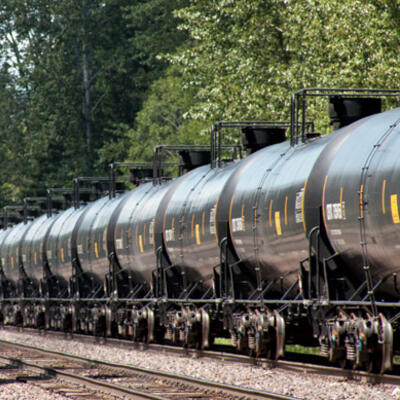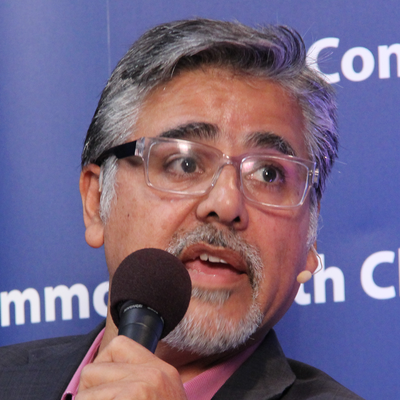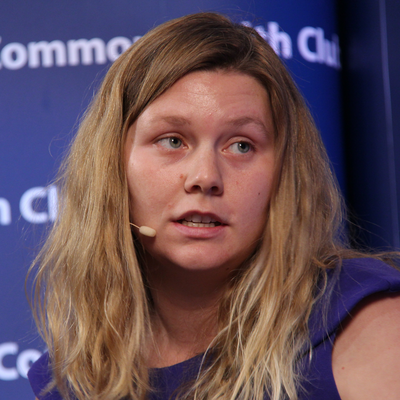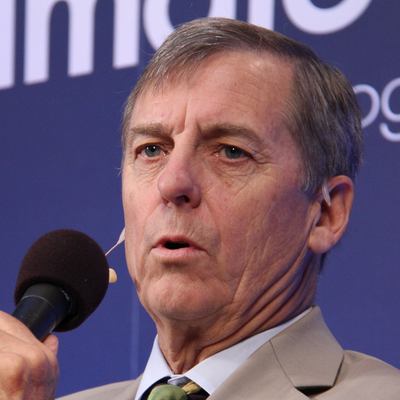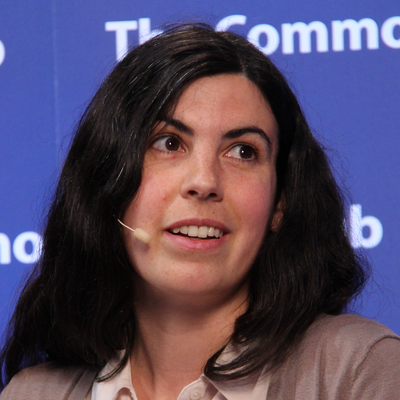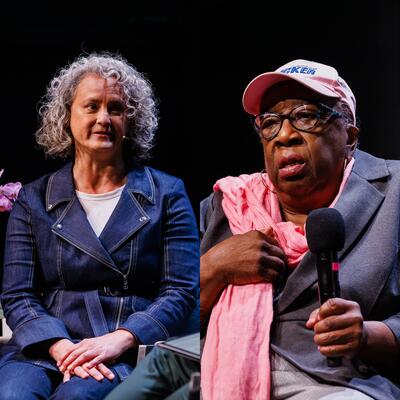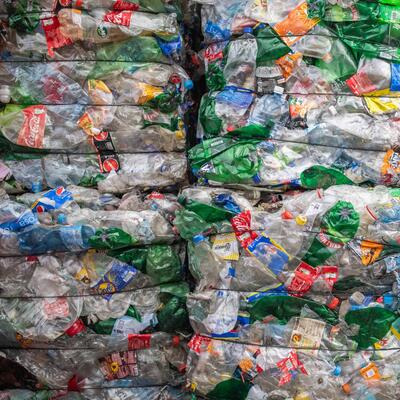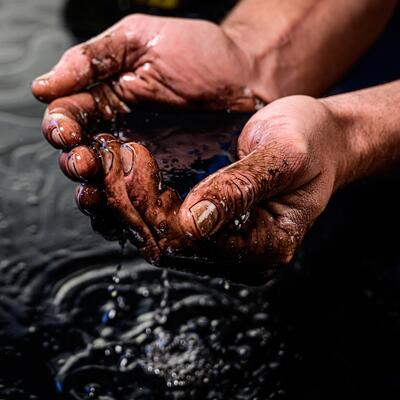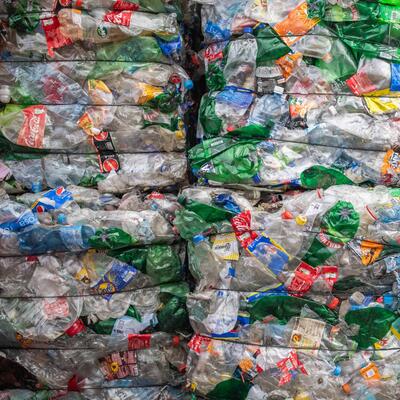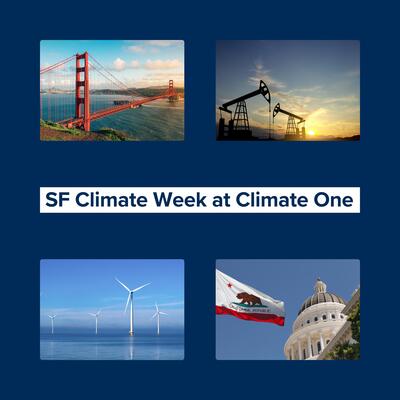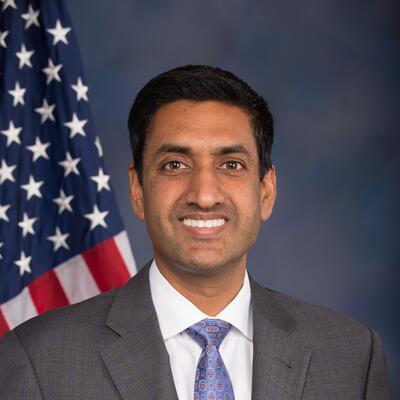Greg Dalton: Welcome to Climate One. Changing the conversation about energy, economy and the environment, I’m Greg Dalton. Today we’re discussing oil in the bay area. California is the country’s biggest gasoline market and home to two-thirds of the oil refining capacity in the Western United States. With hydraulic fracturing or fracking causing an oil and gas boom in North Dakota and other States, the supply of domestic oil is surging. A small and growing percentage of that oil is coming into California on railcars raising concerns about public safety. Here in the Bay Area, five oil refineries in the East Bay supply the fuel that gets us around and powers our regional economy.
Without gasoline, diesel and jet fuel our lives would grind to a halt, yet burning oil and other fossil fuels is driving climate disruption that’s increasingly linked to mega-fires, searing drought and other extreme events with high economic cost. Over the next hour we will discuss moving and using oil and the prospects for a clean energy future.
This program is underwritten by the San Francisco Foundation and we like to thank them for their support. Joining our live audience here at the Commonwealth Club in San Francisco we’re are pleased to have the us four guests; John Avalos is a member of the Bay Area Air Quality Management District and a member of the San Francisco Board of Supervisors, Jess Dervin-Ackerman if with the Sierra Club San Francisco Bay Chapter, Molly Samuel is a reporter with KQED Science, and Tupper Hull, Vice President, Strategic Communications with the Western States Petroleum Association. Please welcome them to Climate One.
[Applause]
Greg Dalton: Before we begin, I should mention that we invited BNSF, the railway bringing crude oil into the Bay Area, and they declined to participate today. We hope that they will do so another time.
Jess Dervin-Ackerman, the Bay Area economy relies on fossil fuels, it will for a long time into the future. Isn’t it better to get this from domestic American supply rather than petro-dictators overseas?
Jess Dervin-Ackerman: I can see why you would say that actually what we’re seeing right now is this transition to extreme fuels and we’re seeing oil companies try to invest billions of dollars in new infrastructure to be bringing those new extreme fuels to the Bay Area refineries, and what we don’t want is to lock ourselves into 35 or 50 years of new infrastructure that needs to be used in order to pay those bills. We should be spending that billions of dollars on clean energy locally in the Bay Area to transition.
Tupper Hull: Well, this is a term that you see a lot and there are a number of initiatives around the State. There's nothing extreme about the oil and natural gas that’s being produced in tremendous abundance in the United States. There's a reality that we face in California as we confront this climate change challenge that we’re all involved in addressing and that is we are the third largest gasoline and diesel consuming entity on the face of the earth behind the United States as a whole and China. China’s actually surpassed the United States. Our members have an obligation to supply that market as efficiently, as safely and at the lowest possible cost they can. So you have an abundance of energy production, we are in the unheard of posture today of being close to energy independent. Energy independence means a number of things; we’ve seen the lowest greenhouse gas emissions since the 1990’s because of the conversion from coal electricity generation to natural gas; we’ve seen a tremendous reduction in energy prices in the Midwest that has resulted in a huge resurgence of manufacturing; but perhaps most importantly, and we have a beautiful example of this today, consumers in the United States and in California are directly benefitting from the energy renaissance that’s taking place in this country.
If you see the events that are occurring in the Middle East and in Eastern Europe today, I can assure you a couple of years ago two things would’ve happened: energy markets would’ve spiked and gasoline prices would have followed, and what are we seeing today? We are seeing crude prices coming and consequently gas prices coming down. And that’s because the United States is now in a much different position, is producing record amounts of its own domestic energy and the only that we consumers in California could benefit from that is to bring this product in on rail. So, there are serious and legitimate questions about the safety. We’ve all seen the accidents and the horrific pictures of accidents and there's tremendous effort underway both in Washington, Sacramento and elsewhere to look at the existing infrastructure, to look at regulations and practices and make sure that that transport is occurring safely.
Greg Dalton: Molly Samuel, tell us -- set a baseline here, what kind of oil is coming into the Bay Area, where is it coming from, where is it going?
Molly Samuel: Well, it’s -- we don’t have exact numbers, you know, the refineries themselves know what they’re bringing in, but you know, it’s proprietary information, it’s competitive. They don’t want to tell us exactly. The one thing we are able to find out and this is because of a Federal order from the DOT, an emergency order that said because of safety concerns Bakken crude, the crude from North Dakota which is more volatile, when these trains derail they explode, if you got a train carrying a million barrels or more -- no a million gallons or more, sorry, coming, you know, travelling through a State railroads, you got to tell States when this is happening and so now we know that about one train a week carrying that amount of Bakken crude is coming into Richmond and this is information from BNSF and it’s coming into the Kinder Morgan, into a rail yard in Richmond. So that’s what we know about the Bakken Crude.
There's also crude coming from Alberta, from Utah, from New Mexico. There's all kinds of crude coming in by rail but where exactly it’s going we don’t know.
Greg Dalton: But that’s happened for a long time. What is it about the Bakken crude that’s new or different, I mean railcars have been coming in for decades and no one really heard, you know, there not much fuss.
Molly Samuel: Rail is actually pretty new here. I was looking at CEC numbers, California Energy Commission numbers, in 2008 no crude came in by rail and I think in 2013 it was more than 6 million barrels. I think I got the number right? So this is a new phenomenon. Not all of it -- there are different concerns with different types of crude but it’s the Bakken from North Dakota that we’ve seen, you know, there was an explosion last July in a town with Quebec that killed 47 people in this downtown. It was not people connected with the railroad or with the oil refineries. It’s people in a bar near where the train exploded. There have been derailments and explosions in Alabama, in Virginia, in North Dakota, so we’ve just seen it’s more volatile and the train cars that are carrying it aren’t safe enough.
Greg Dalton: And what is the Federal Government doing about those train cars?
Molly Samuel: The Federal Government has proposed new safety regulations. The recommendations -- the public comment period actually just closed this week on those recommendations and the next step is that they will at all the thousands of comments they got, and it’s going to take a while. These regulations, they’re a bunch of different proposals but, you know, slower speed limits, improved safety on the railcars, higher tech breaking systems. One of the concerns and Jess may bring this up is how long is it going to take for these recommendations to actually come into place; meanwhile the trains are still coming.
Greg Dalton: John Avalos, you obviously represent San Francisco but you're on a regional board that’s more concerned with air than with sort of rail safety, but how do you view the sort of the regional response to these oil trains coming in that are sometimes from out of State; who regulates them; they cross County, State lines. Your view on this?
John Avalos: Well, we’ve actually just started to weigh in on this issue. We’ve heard a lot from the public. We have a lot of concerns about oil by rail coming into the Bay Area and they’ve seen that there's been a huge increase in recent years. It’s been about 4,000 percent increase over the years. My perspective is that accidents happen, accidents will happen. One of my earliest memories, I grew up in a town called Wilmington, California, which is actually in Los Angeles and Wilmington is surrounded by refineries. There's a big one Texaco, Union 76 is close by, all around us are refineries and one of my earliest memories is an explosion that had happened at the Texaco refinery and I saw a big ball of fire go up into the air and we were told that that would never happen. That would be the only one. But we’ve seen other things that happened since then and we’ve seen -- because we’re at a time where we’ve reached peak oil, we’re now doing extreme ways to get oil that is very harmful for the environment.
So, at the Air District we take this very seriously. We just recently had the explosions at the Richmond Chevron refinery and that put thousands of people to go to the emergency room and we need to make sure that what we’re doing as we’re seeing the oil industry change and a dramatic increase in oil coming by rail that we have to make sure that are safety standards in place. We don’t necessarily have standards over the rail lines, that’s going to be other agencies, State and Federal, but we want to look at do our part especially when we are seeing that the change in oil coming in is the Bakken and potentially tar sands is, you know, more toxic. That’s going to be a concern for us. If there's more toxicity to the oil then that’s going to actually increase the volatile chemicals that are put in the air, sulfur dioxide’s put in the air. These are all the things that we are monitoring at the Air District and those have harmful impacts especially on the communities close to the refineries, but it actually affects the whole Bay Area.
And then we were concerned about climate change as well and we know that this fuel also is much more carbon intensive and we have huge goals of that that we want to meet to meet our climate goals and if we’re seeing this change carbon intense fuel coming in we’re going to see it much more difficult to achieve these goals.
Greg Dalton: We’ll talk about more climate later in the broadcast.
Tupper Hull, I spoke with a spokesperson from a rail line who said, look you know, kind of pushed it back on the oil industry saying, well our clients own the tankers and we don’t really know what's in it or where it goes, so where’s the responsibility here between sort of the shippers, the oil companies, and the railways who are, I guess what they do is they own the right of way and they operate the engine.
Tupper Hull: Well, I understand the railroads recommended that you contact me and I can't tell you how much I appreciate their recognition of our role. It’s a shared responsibility. In fact, it depends on the nature of the cargo. There are unit trains in which the cars are owned by the oil company that owns the product and then there are manifest trains where a company will put in an order and that product is delivered in a car that’s owned by the railroad, but the fact of the matter is the railroads are taking tremendous steps to change the way they operate, to work with the U.S. Government in the types of equipment that are being integrated into the system. The oil industry has recommended since 2011 the upgrade of construction standards for rail cars and was disappointed that those standards never got adopted. They’ve been integrating those cars into the fleet ever since and so we’re well underway to bringing the fleet of rail cars up to standard.
It’s a large fleet, it’s a very expensive process, but you know, we’re certainly, our members are making the investment to put the stronger, better constructed rail cars into service as quickly as possible.
Greg Dalton: Is there a target date for when they’ll all be converted to this sort of newer --
Tupper Hull: There are dates within the federal rule making that’s underway right and I’m sorry I don’t know what they are.
Greg Dalton: 2018.
Tupper Hull: That is the end date but there are interim dates in which large portions of that fleet are being integrated.
Greg Dalton: Jess Dervin-Ackerman, I want to ask you, there's a couple of ways for the Bay Area to get oil, one is to drill for it in California, it can come in by rail, it can come in by ship which a lot of it has in the past or, you know, those are really the way -- pipeline, right? So, I think the Sierra Club doesn’t support any of those, so do you have a -- if we’re gonna get oil into the State or extract it in State what's the best way to do it in the short term?
Jess Dervin-Ackerman: Well, the truth of it is that we actually don’t have any pipelines coming into California right now, so that’s not even an option, but between --
Greg Dalton: Would you like to build some?
Jess Dervin-Ackerman: Absolutely not. I definitely think -- as we said before, you know, I feel like that is a totally false choice, you know, it’s not about we have to do this and what’s the safest way to do it. It’s about the fact that we actually shouldn’t be investing billions of dollars in new infrastructure that’s not safe or that will cause harm and it will also contribute to climate change. And, you know, what Molly and John brought up is that actually, you know, we’re running out of conventional oil in the United States and in the world right now and what we’re moving towards are these more extreme fuels, the term I used earlier to describe tar sands, which to get one barrel of oil digs up four tons of concrete and dirt and also clear cuts pristine boreal forests in Canada and Alberta. And then the Bakken shale, which uses very dangerous and flammable and cancer causing fracking fluid which is then included in the train cars that bring that oil to any refineries where it’s refined.
So neither of these sources, tar sands or Bakken, which is actually what most of the refineries are looking at switching over their crude stock to, are safe, so we shouldn’t be discussing what's the best way to bring these unsafe fuels to the Bay Area and through thousands of residence communities from North Dakota or Canada to the Bay Area, that’s just a completely false choice and I think we should actually be inverting these billions of dollars in local renewable energy, energy efficiency, you know, other lower carbon fuels to, you know, run public transit or cars but, you know, I just think that’s a false choice and we shouldn’t even be discussing that.
[Applause]
Tupper Hull: Look, we have a reality within the world that we live in, a very industrialized mobile environment. We need 44 million gallons of gasoline every day in California. It’s going to come from petroleum. Now we can talk about what the future holds but our members have an obligation to supply that market day in and day out and as I said they’re going to do it as safely as they can and they’re going to do it at the lowest possible cost they can. And so this terminology that’s being used, I understand it’s appeal, it is not based in recognition of the realities we face. We’re talking about a transition to a lower carbon future that’s generational. That’s the reality. We’re going to need fossil fuels for a very long time. U.S. information administration forecast, which is the best forecasting agency we have, looks at all of the technology and all of the regulations that are encouraging and incentivizing the development of alternatives.
By 2040, 80% in their estimation of our energy supply will continue to be supplied by fossil fuels. So, again, I mean it’s one thing to advocate when you have no obligation to anybody to produce the produce the product that they expect to be there when they show up at a service station tomorrow. That’s the obligation that our members have and they’re committed to doing that as safely and efficiently and at the lowest possible cost they can.
Greg Dalton: John Avalos, you put forward a plan for the Bay Area to move faster toward a clean energy future. I’d like to have you weigh in here and the reality is petroleum’s going to be with us for a long time but what's your plan say?
John Avalos: Well, our plan is moving towards hitting our goals, our targets that were set, AB32 around climate change that we want to be at 80% below 1990 levels by 2050 and we have to take steps to do that.
So market conditions for the oil companies and transnational oil companies are very different from the market conditions that we work under. Market conditions for us are about is our environment safe? Do we have regulations in place? Are people protected? Do we have jobs for people? And I think the market conditions are from the oil company point of view is lack of regulation. There hasn’t been a single regulation that we put forward from the Air District that hasn’t been opposed or competed with from the oil industry and what we’re just trying to do is make sure that people in the Bay Area are protected. So our ten-point climate action plan is really aggressive. It’s actually years late, what should have been done earlier and it actually makes sure that we’re hitting our targets, we’re taking inventory, we’re hiring new engineers to measure what's coming in, we’re helping municipalities create their own plans to meet climate -- their own climate plans and providing that level of expertise, but we’re way behind here, we are way behind the ball.
Greg Dalton: Tupper Hull let’s get your response that Industry’s sort of slowing this transition, playing, you know, blocking this transition.
Tupper Hull: I’d like to note that Mr. Avalos references the 2050 goal that was part of AB32. The far more immediate and more developed goal was a 2020 goal of reductions to 1990 levels. We’re going to hit that goal in California around 2017 or 2018, so we are making tremendous progress culturally and as a society. Our industry is changing. The transportation fleet is changing. We are making huge progress towards a lower carbon future.
Greg Dalton: Part of that is reduced demand for gasoline. We have more efficient automobiles. There's some cultural changes, younger people not owning cars and driving as much. Is that a challenge for the oil industry and can you envision maybe a contracting industry in State because demand is diminishing?
Tupper Hull: It’s a reality that our members accept. Remember we’re talking about companies, our members, are companies that operate in a global theater, so they are looking at investments around the world and are adapting to changes in jurisdictions all over the world. They are also making investments into the alternative and renewable technology field. Why? They understand that’s where we’re going. They intend to be commercial participants in the market that in the future. So, they’re very smart people. They’ve been very successful at operating their enterprises and they’re going to continue to provide the fuel that’s required and needed and that is a -- as I mentioned earlier, going to be a future that has probably lower demand for fossil fuels but they’ll be there in participating in the demand for the alternatives.
Jess Dervin-Ackerman: Sorry, can I just jump in here for a second. I’m hearing a lot about talking about how we’re actually, you know, we’re still going to be dependent on fossil fuels by 2050 or 80%, you know, we’re going to still use fossil fuels by 2050 and that’s actually in California not true. The California Energy Commission numbers show that in California we’re decreasing our use of fossil fuels but I think what Tupper is getting at is the fact that our refineries in the Bay Area are global players and actually everything that we refine in the Bay Area and all the oil products we create are actually a lot -- some of them are being exported, so they’re not to be used here. And the point I want to make on that is that all of these decisions for new projects -- every Bay Area refinery right now is trying to expand and there are additional oil infrastructure projects that are trying to be added in the Bay Area. And these are not to serve the Bay Area necessarily but they’re actually to serve the companies and their global markets of oil products and these decisions are actually -- should be made in the best, you know, to benefit local communities. They should be in the best interest of the local communities and what we’re seeing actually is that they not.
And, you know, recently I heard a State lawmaker say, “Oh, crude by rail, our hands are tied. We can't do anything.” And John actually said also, you know, the Air District has no jurisdiction over these -- the crude by rail, you know, coming into California. They actually do. The Air District has authority over an air permit for any new rail terminals that are built within the nine-county Bay Area and we have tremendous opportunities for local communities to actually weigh in about whether these projects are the right fit for them and that’s what these decision should be being made on not whether, you know, Chevron needs to expand so that it can make more money exporting oil out of the community. You know, this is -- for a long time the oil companies have been able to make these decisions and shove the community aside and that is not the case anymore and the community is rising up and actually making their voices heard. As John also said, you know, they’re really getting at the Air District because they do have some authority here and the other decision-making bodies are often local city councils or a board of supervisors but those are on the refinery project when the refinery sits on city or county land. In the case of the Kinder Morgan rail terminal in Richmond it’s actually BNSF land which is federally regulated. So, literally this terminal was switched over from ethanol to Bakken shale oil, the very explosive and terrifying kind of oil that we’re transporting by rail now, without any public process at all and without even local decision-makers on the Richmond City council knowing, you know. We know there's example of a woman who lives literally across the street from this rail terminal and she did not know until KPIX, the local CBS here did an investigative journalism piece. So the Sierra Club along with other groups has actually sued the Air District over that permit and issuing that permit without any kind of public process.
And what we need to see is the local communities being part of the decision-making process because if we are going to transition our energy economy, no matter what it’s not a choice now, we’re running out of conventional oil, we either go, you know, towards the extreme energy era and we’re totally screwed on the climate or we move to a clean energy economy, the people in the Bay Area need to be part of those decisions.
[Applause]
Greg Dalton: -- is with the Sierra Club San Francisco Bay Area Chapter. Our other guests today at Climate One are
John Avalos from the Bay Area Air Board and the San Francisco Board of Supervisors;
Molly Samuel from KQED and
Tupper Hull from the oil industry.
John Avalos.
John Avalos: I actually visited Richmond a couple of weeks ago just to check out the Kinder Morgan site and it was really incredible to see how close that site was to Point Richmond which is actually a fairly populated part, it’s all populated but it is a really closely populated part of Richmond and was there was also a school that was right there as well. And when the Kinder Morgan facility and the trains are maneuvering, they’re actually coming in to Point Richmond and the tracks are about 50 yards tops from the school. And so there's a lot of concern that residents have about the safety, especially when you’ve seen the derailments and explosions that have happened, Lac-Mégantic, Quebec being the biggest one, that was July of 2013 where 47 people died. So, people have great concern about derailments that have happened as these trains are going through urban areas and areas that are populated, and actually ForestEthics has on their website this image of, you know, what the blast zone is around this area. It’s about a mile distant from the actual train tracks and so we know if you look at the Bay Area what the blast zone looks like it’s in the most, you know, populated parts of the east bay along the bay front and that’s a pretty frightening, you know, thing to consider. How likely is that to happen? It can happen.
Accidents will happen, but there's other places around the country, 25 million people around the country are actually along the rail lines that will be used to transport oil from North Dakota and other places.
Greg Dalton: Molly Samuel, you’ve done some reporting on preparedness. Are first responders ready for this? Where can people go to find out if this is near them?
Molly Samuel: I was actually going to take a step back before getting there and explain, you know, who can regulate this actually because, you know, a lot of times and I assume, you know, often on Climate One you're discussing why California is leading in things, for instance air regulations. California can't lead here because the railroad are regulated by the Federal Government and got to wait, and California has tried in the past. There was a terrible spill 1991 that spilled pesticide down the, I think it’s the Sacramento River. For 40 miles it killed every fish, every insect, it killed everything. The California Public Utilities Commission which regulates rail in theory in California tried to just make that track stronger, that bend in the track and lost in court. Can't do it, can't -- only the feds can regulate rail in that way and so that’s why, even if you’re hearing cities, you know, Berkeley, Davis, Richmond, the city councils have all passed resolutions saying we oppose crude by rail, it doesn’t matter. Not even the State can do anything to make it, you know, if they’re concerned about safety. In terms of preparedness, you know, here in the Bay Area if something terrible happened there are first responders. There are fire departments that are prepared. If a spill happens say, you know, up in Dunsmuir again, if there was an accident there where that spill was in 1991 -- you’re talking volunteer fire departments, do they have the foam trucks prepared? It’s not everywhere up and down the lines are the first responders prepared and they don’t know when the trains are coming. So -- their hands are a little tied.
Greg Dalton: Is someone trying to get that information in terms of what particular trains, has the industry been providing that information about rather than just sort of six months after the fact, in a timely and detailed fashion?
Molly Samuel: So the executive order, the emergency order that said railroad you got to tell States what's going on that did a little bit. What the State of California through the California Office of Emergency Services is getting now is retroactive information. So, it’s saying is what they’re able to work with is essentially on about once a week a train comes through. They don’t know when the train is going to come. Now, I understand that the State is working with the railroads to get better information but right now that’s what first responders have to work with.
Tupper Hull: So let me talk about the role that the State does have because the State does have a role and it is acting on that role. The State of California and the new budget is going to expand the marine spill and prevention program that I think is recognized as one of the best in the world to all inland areas to cover crude by rail. Our members and ultimately the consumers of our products are going to pay a little more to finance that program. There's still a great deal of debate that’s going to occur about how those funds actually get deployed. Our position is the first people who should be in line of that are the first responders located along the rail lines. Secondly, we supported the bill by Assemblyman Dickinson that will require the railroads to provide to the Office of Emergency Service and therefore the first responders the very information that Molly has been talking about. So, there's a lot of work being done. There's a lot more than that being done but those are two examples of the steps the State and the oil industry has taken to address this issue from a safety --
John Avalos: What I’m concerned about is that safety comes last. It’s always the changes that are happening and then the safety measures will follow suit. What we had in Richmond there was a change from ethanol to I believe it’s Bakken crude and actually no one knew from the public knew about until after the fact, there was a, NBC or ABC did a story about it.
So, now we’re talking about what we’re going to do to prevent that from happening again or to make sure there are safety measures in place, why aren’t we thinking about that beforehand. This is all -- the changes in the oil industry are being driven by the oil industry and we’re playing catch up to figure out how we can protect the public and protect the environment. It should be the other way around. We should be putting those measures in place. We should be driving what the market is by reducing our dependency on oil going more to renewables and we’re challenged at that in so many ways. And the biggest challenge we have is pay to play politics is that how of the money that comes in to elected officials and people who are decision-makers influence what they do. This past year we had huge plants in San Francisco to create our clean power program to have a whole renewable program here in San Francisco for local residents to tap into and it was defeated by PG&E and the mayor’s administration that is actually in the pocket of PG&E. When we actually are able to change our politics we could actually promote environmental measures that are gonna put the public and the environment first.
Greg Dalton: Tupper Hull, do you think that industry self-regulation and self-action is enough or should there be more -- does there need to be more oversight in some places on rail or refining, etc.?
Tupper Hull: I have to tell you from the perspective of the oil industry the idea of self-regulation or a lack of regulation and oversight in California is not an accurate picture. We operate in the most heavily regulated environment in the world in California. Consequently, refineries in California are the lowest emitting refineries in the world and produce the cleanest burning fuel. So we are heavily regulated, probably more tightly regulated than anywhere else. We continue to work within that environment. We have a point of view, we’re going to express that point of view as effectively as we can and to suggest that we’re operating in an unregulated market is not an accurate portrayal.
Greg Dalton: Let’s get a baseline in terms of climate. Is climate disruption happening? Is it caused humans burning fossil fuels?
Greg Dalton: Let’s talk about the solutions then from that in terms of that in terms of what is the path forward, is it ethanol? Is it biofuels? What's the path forward in innovation for getting a cleaner, greener economy?
Tupper Hull.
Tupper Hull: Our view is the path forward is technology. The technology that will continue to give people the sorts of mobility, the convenience, the comforts that they’ve come to expect is the only way you're going to bring this lower carbon future without having an enormous backlash on the part of people who are not -- don’t live in the Bay Area are not in this debate here today. They’re getting up. They’re going to work. They’re trying to provide for their families and they have an expectation that they’re gonna be able to do that and so providing them an alternative to do that in a way that they can afford and integrate into their lives is absolutely essential. To talk about these things as if we’re going to impose higher cost, fewer options, less mobility to people in our view is a loser, absolutely a loser.
Greg Dalton: Higher cost but any economist would say, in fact I’ve talked here with George Schultz and many economist who would say that there are costs of burning fossil fuels that are put on society that are -- they call them externalized and that in a real true accounting world the cost of burning fossil fuels ought to be borne by the people who burn them. They are paid by society at the hospital and other places with asthma and other social, you know, the drought and extreme weather, so shouldn’t people who burn fossil fuels like me and everyone listening to this in their car pay for those true costs of burning fossil fuels? A carbon price.
Tupper Hull: Well, I mean they are. They are in California now. We have a cap and trade program where the costs from the stationary source side are beginning to be built into the products that are sold. In January of this year were gonna bring gasoline and diesel. For the very first time anywhere in the world, California will regulate gasoline and diesel sales under a cap and trade program. We have a position about that. We don’t think the public is prepared for it. We are advocating it be delayed. I don’t think we’re going to be successful with that advocacy. The governor said in his speech to the U.N. Climate Summit that he was determined to go forward. But we’re going to see the delivery of that cost in a very stark way beginning January 1 in the prices we pay for fuel. Now, whether or not people find that acceptable who are the ultimate arbiters of this remains to be seen but we are on that path. Nobody in our industry is questioning that that’s the path we’re on. There’s a lot of discussion about, you know, a carbon tax. It’s interesting that the policies we’re pursuing in California in our view are largely designed to try to mask that monetizing of carbon form the ultimate consumers and we think it needs to be transparent, upfront and let the consumers and the electorate make that ultimate decision.
Greg Dalton: I’m Greg Dalton in Climate One; we’re talking about oil and fuels in the Bay Area today.
Jess Dervin-Ackerman, your response to that in terms of the path forward and the impact on California drivers in January when transportation fuels come into the cap and trade system.
Jess Dervin-Ackerman: Sure, and we actually just saw a poll from Californians which said they were actually willing to pay more for transportations fuels if it helped us with climate protection. So, I think Californians are speaking for themselves here in this situation and, you know, there definitely has to be an equity piece to this. We know that some folks can afford to pay for those things and those are usually the folks that are buying the, you know, electric cars right now.
We definitely need to build that into the way that we’re creating this clean energy future. We need to be able to make these solutions equitable and available to everyone in California. But, you know, we’re seeing that Californians are ready for this. They know what's it’s gonna take and they’re ready to do it.
Greg Dalton: John Avalos, your elected here, are your constituents on board with higher gas prices next year to fight climate?
John Avalos: I think there’ll be a lot of concern about the price going up. There's a lot of work that needs to be done in terms of explaining what the costs are gonna be external to the price of gas and that’s something that I talk about all the time. I’ve actually been working really hard to promote transit in my district and it’s a very hard thing to do because our transit facilities aren’t quite as strong as a -- infrastructure is not as strong and built out as it needs to be, so people have the best option for them they believe is in their car. And so I’m working against the tide but I think that’s what has to be done. We have to talk about things that are actually difficult to talk about in terms of the cost going up and the immediate cost going up but the cost down the road or even the cost of asthma and the conditions that we face on a daily basis are great and they’re related to what is happening with people using their cars at a greater amount than they should.
Greg Dalton: And what is your view on California’s overall climate plan. Is it going fast enough at the State level, Governor Brown, everything else? Is it going as fast as it needs to go?
John Avalos: Well I -- I think it’s going in the right direction. California is actually away ahead of a lot of other States in the country. So, I actually think it’s important that there's a way to share what's happening in California and the Bay Area with other places that we have examples that it is possible to have regulations and targets that can be met and so that’s I think the work that needs to get done. But yeah there's always need to be -- we need enforcement to make sure that it happen. We need public education that needs to happen. We also need to build out our public infrastructure as well that can give people options from using fossil fuels.
Greg Dalton: Tupper Hull, one thing that people do to get away from fossil fuels, they drive an electric car. Is that a threat to the oil industry?
Tupper Hull: No, I drive an electric as a matter of fact. I have a Chevy Volt. I also drive a racecar and I have a truck that hauls it. So, you know, this a good example -- not to toot my own horn.
[Laughter]
Greg Dalton: Go ahead.
Tupper Hull: -- of using the technology that’s the most effective. I have needs and I have recreation and I have adapted the available technology to fit that. But that was an expensive car to buy. I’m fortunate enough to be able to afford it and a lot of people can't. And so bringing that technology into a fleet of 38 million vehicles is gonna be a challenge and is gonna take a lot of time. It’s gonna require a lot of patience and assistance on the part of the public agencies to bring the people who are not enjoying the economic recovery that’s occurring on the coastal portions of California. You know, there are two states in California right now and one of them is thriving and one of them is not. The Central Valley and the counties that are in the Central Valley are not in a recovery, they’re in a depression. Unemployment is extraordinarily high and those folks need to be taken into account as you all in the Bay Area and on the coast, you know, debate where you think public policy needs to go.
Greg Dalton: A few years ago cellulosic biofuels, drop in fuels that can be put into existing gasoline tanks, into existing fuels pumps, existing infrastructure were all the rage. They were gonna save us and didn’t really pan out that way. What happened?
Tupper Hull: Well, this is a good example in our view of government’s poor track record in picking winners and losers. So we have a regulation in California called the low carbon fuel standard and this was a regulation that said you need to reduce the carbon intensity of fuels by X amount over a period of about 10 years.
That regulation has been frozen for the very reasons that you mentioned. It was developed at a time when there was tremendous expectation that the cellulosic ethanol and this is an alcohol-based fuel that can be made in the lab from landfill waste, from waste agricultural products, so it has a very low carbon intensity. You're not converting food production into some fuel production uses. You do take a lot of energy to do it but the reality is that technology did not evolve in the way that it was anticipated, and so today we still do not have commercial cellulosic ethanol production at any scale that would be necessary to provide that kind of blend stock to create the carbon intensity targets in that regulation.
It will be developed. We’re confident of that. Somebody will figure out how to take what works very well in the lab and produce it at the enormous volumes we need. But it’s not there and we’re stuck with a regulation that without it we’re looking at some very serious problems on the supply side to meet the regulation with a compliant fuel is gonna be tough, in our view infeasible.
Greg Dalton: Tupper Hull is a spokesman for the oil industry. You're listening to Climate One. I’m Greg Dalton, we’re talking about oil in the Bay Area.
Jess Dervin-Ackerman, cellulosic biofuels have been disappointing. One of the early promising companies, Solazyme, sold a lot of fuel to the Navy and they started making things for makeup and other things which are higher margin lower volume things. There's been some disappointments. So the transition may not be as easy as you’d like it to be.
Jess Dervin-Ackerman: I think I want to take a step back and actually get us out of transportation fuels because I have to admit I’m not a scientist that works specifically on transportation fuels.
Greg Dalton: It’s usually these guys who say I’m not a scientist.
Jess Dervin-Ackerman: So, and part of it is actually -- out of our entire greenhouse gas inventory, transportation is a big portion of it, but another portion of it right now is our electricity generation. And that’s something that John brought up earlier talking about how San Francisco and actually the Bay Area is leading in the transformation to a clean energy economy in the electricity sector using a program called Community Choice Energy, which is actually using or municipalizing our energy source, our electricity generation and letting local jurisdictions make their decisions about where their electricity generation comes from for all of the residents within their community. So we’ve seen Marin Clean Energy, which offers 50% and 100% renewable electricity to their customers, Sonoma Clean Power in Sonoma just launched this year. They also offer 33 and 100%. San Francisco actually started to work on their program called Clean Power SF about 10 years ago in 2004 and the plan is to offer only a 100% clean energy option and this would automatically switch over all residents within the city. And actually in the summer in June of this year, Alameda County, which has 1.5 million residents actually also put down 1.3 million dollars to move forward with their own community choice energy program. So we’re seeing a transformation not just in, you know, in transportation sector but also in the electricity sector. And I think we need to talk about this in a much larger picture because there are lots of different moving pieces here but we -- what I’m trying to say is that we actually have the solutions we need to create a clean energy economy and we are doing it in the Bay Area and we are leading it. And all over the State actually, you know, Monterey, San Benito and Santa Cruz counties are also trying to create one of these programs. San Diego County is looking into it. And speaking of the Central Valley, Lancaster, California is also going to create theirs and they have been moving mountains in terms of solar energy for electricity generation for their members.
Every new home that’s built in Lancaster has to have solar on its roof. And they are going to be the next Community Choice Energy program that’s launched, I bet you.
Greg Dalton: Jess Dervin-Ackerman is with the Sierra Club San Francisco Bay. Before we go to
John Avalos,
Tupper Hull, one of the delicious ironies of this is that at least in Marin it’s Shell Oil that’s involved in delivering clean energy, or maybe that’s the case in San Francisco. There are actually oil companies getting involved in this consumer choice democratization of the power industry. It’s a business opportunity for them.
Tupper Hull: Well that’s what I said, I mean these are companies that are very smart and they’re committed to the economies in which they operate and they’re gonna operate successfully based on what the regulatory environment is and the social and cultural environment. They’re gonna make that change and they’re part of it. And by the way Lancaster isn’t in the San Joaquin Valley.
Greg Dalton: John Avalos, what's the future of this community choice where people get to pick their power and can the monopolies - the utilities stop this?
John Avalos: Well, we’ve seen that PG&E and the monopoly utilities have tried to stop them. They had, what was it, Prop 26 that was or --
Greg Dalton: They tried to amend the State Constitution.
John Avalos: Prop 16 that was on the ballot in 2010 and they put it I think it was like 25 million dollars statewide to try and have their measure passed but people all over the State rejected that and that was really exciting. We were able to see Marin Clean Energy go forward and then Sonoma since then.
Lancaster’s being talked about. What's really exciting about Marin Clean Energy is that they’ve actually expanded to places beyond Marin. Now they’re gonna be in Richmond. There's a facility in Point Richmond that will be providing solar power. There’ll be jobs that are gonna be created from that. So they’ve actually gone across into, I think that’s Contra Costa County which is something that we’re seeing is very, very exciting.
We can't seem to get our program off the ground in San Francisco and for me it’s related to PG&E being based in San Francisco and they have a lot of influence over elected officials and commissioners who play a role in blocking the ability to move forward on our clean energy plans. And so I know it’s a matter of time that we’ll be able to do that if we could change some of the politics around that. We have one of our PUC commissioners who’s here, Francesca Vietor, who is actually a supporter of the program, but the majority of people in the Public Utility Commission who were gonna be supporting or green lighting our Clean Power SF program voted against it. It was very unfortunate. There were unions that were lined up against it. There were other elected officials that were lined up against it. PG&E came out hard against it and the politics went away. So seeing that there were other counties that were actually implementing their clean energy programs like Community Choice Aggregation Program is really exciting and we know more are going to be jumping in line as well.
Greg Dalton: John Avalos is a member of the Bay Area Air Board and also a member of the San Francisco Board of Supervisors. We’re talking about energy and oil in the Bay Area. Let’s go to our audience questions, welcome to Climate One.
Female Participant: Hi, my name Deb Self. I’m executive director of San Francisco Bay Keeper, keeping the bay safe from pollution including oil spills. I’m also the vice chair of the State’s Oil Spill Technical Advisory Committee and I actually have just a couple of comments.
In the first year that we started importing oil into the state by rail, we exported 7.8 billion dollars’ worth of oil overseas. I also just wanted to comment on what the State can do, it’s true we just got -- the governor got behind a trailer bill that expanded the State’s oil spill agency to cover all inland areas which is essential. If we can go back to oil by rail for a second. However, Union Pacific and BNSF have asked their lawyers to tell the State to stand down, that they are under no obligation under federal law to coordinate with the State on spill response, spill planning or notification.
Greg Dalton: Let’s have our next question.
Male Participant: Yes, I’m Charlie Peters, Clean Air Performance Professionals, we’re a coalition of motorists and we’re very interested in the other part of the rail transport which is the ethanol which is a very comparable amount of cars coming in with very comparable kinds of hazards. We’re under the impression that no one ever checks our water supply for the ethanol. No one ever. It is a carcinogen that causes cancer. When are gonna have somebody take a look and find out what kind of impact ethanol and the new butanol that’s coming is having on our water supply that may be affecting us all, causing cancer, that nobody is giving any attention to whatsoever.
Jess Dervin-Ackerman: I would say talk to Deb Self who’s the executive director of SF Bay Keeper. She would probably know more than I do. She's here in the audience today.
Greg Dalton: Let’s have our next question. Welcome to Climate One.
Male Participant: Yes. Used to be that poor communities lived on the wrong side of the tracks, well nowadays either side of the track if you're close is the wrong side. The most impacted communities the gentleman referred to, the two Californias, well one of the Californias are the people who are in poor communities, people of color who live near the tracks. What possible guarantees can you give them that an accident isn’t gonna happen in their neighborhood? The WesPac project in Pittsburgh threatens to bring in 10 million gallons of crude per day. What could go wrong?
Tupper Hull: Well, I think the question was what guarantee can somebody provide a community that an accident isn’t gonna happen and of course it’s a rhetorical question. What we can guarantee, and it’s happening today, is people who are a lot smarter than I am and committed to looking at what the existing regulations are and the existing practices are, are investing a huge amount of effort to make sure that the risks to those communities are reduced to the lowest possible point.
Jess Dervin-Ackerman: You know, we -- normally when we kind of evaluate new projects we do risks assessments and often, you know, at the Air District we use health risk assessments and we say, okay we have a new oil terminal going in, you know, an acceptable death rate from this pollutant is 25 in a million or 50 in a million.
From the oil industry’s own numbers and the rail industry’s own numbers, you know, their crude oil shipments are delivered safe 99.9% of the time. We have 7 million people that live in the nine-county Bay Area, that means we’re willing to sacrifice 7,000 people or a thousand per million. I don’t think that that’s an acceptable level of risk.
Molly Samuel: And also talking about rail, I mean, when you do these environmental impact reports, deciding on projects like this for instance the Valero project in Benicia, you're usually, you know, you're kind of defining where you're looking who’s at risk. And what happens with rail there were people coming in and commenting on this project from Davis, from cities that are way outside of what you would usually look at for health impact saying, “Well, what if there's a train accident? We’re on these tracks.” And so part of the concern with safety with projects that are on rail is it goes all the way back to North Dakota and how do you assess that risk? An environmental impact report conducted by a small city, how does it grasp that? It’s a challenge.
Greg Dalton: So this is challenging lots of things. Let’s go to our next question. Welcome to Climate One.
Male Participant: Hi, Collin Murphy, NextGen Climate America. Mr. Hull earlier you said that technology is the way to achieve long-term climate solutions. I know that WSPA has often found itself opposing several technology promoting policies. Last year in the legislature WSPA opposed AB1992 and AB2390, both of which would have had technology promoting effects. Can you please tell me what sort of technology promoting policies would be available and would be acceptable to WSPA?
Greg Dalton: WSPA being the Western States Petroleum Association that you are part of.
Tupper Hull.
Tupper Hull: I’m not familiar with the legislation. I mean, every year in increasing numbers there are a great many legislative proposals made that are aspirational, that are based again on this point of view that we do not support and agree on, that transferring money from the existing energy infrastructure or energy companies to underwrite or subsidize alternatives is not a -- are not policies that we’re going to support.
We think the development of technologies that are competitive in the marketplace provide the consumers the convenience and the affordability they need, we are all about those types of technology development proposals. But compelling companies that deliver energy today to transfer or to take, you know, to confiscate dollars to transfer to alternatives is not a -- it’s not realistic to think companies are going to support that type of public policy.
Molly Samuel: What if we just transferred these subsidies that the oil industry gets from the Federal and State governments to clean energy, would you not oppose that?
[Applause]
Molly Samuel: That’s not taking any money from the energy companies, that’s taking them from public funding.
Tupper Hull: Let’s talk about subsidies. Let’s talk about -- well let’s not get into to it.
[Audience response]
So there are -- there are zero subsidies provided to the oil industry. That’s a fact. There are tax breaks and investment credits available to all manufacturers in the United States and the oil industry takes advantages of those. If you want to talk about subsidies, talk about the dollars that are going in to subsidize the alternative energy industry in California. I got $1,500 from the State of California back because I bought a Chevy Volt. I was happy to spend it. Did I need it? No. Was that an inducement to my utilizing that technology? It was not. But that is in many ways a cornerstone of what we believe is a misguided attempt to compel the development of technologies in directions that may or may not ultimately prove to be effective.
Greg Dalton: There’s accelerated depreciation that happens if someone puts up a solar facility or a wind facility, they don’t get the same kind of accelerated depreciation that oil and gas gets, so there are some favors, some special treatments for oil and gas.
Tupper Hull: Are you talking about specific to oil and gas or available to the manufacturing sector?
Greg Dalton: Accelerated depreciation for extraction from wells. We had the former chief economist of the World Bank here who estimated that it was worldwide, Nicholas Stern, 500 billion dollars was his estimate of subsidies to the oil and gas industry globally.
Greg Dalton: A lot of that’s overseas.
Tupper Hull: And what was -- and what was -- you need to know and understand what that number is. Those are governments that are subsidizing the cost of fuel for their citizens. That is not -- those are not subsidies and is not, you know, reflective of government policies in the United States to underwrite or subsidize petroleum energy production.
Greg Dalton: Some of that’s true overseas, some of that’s in the United States.
John Avalos.
John Avalos: So I wanted to kind of link in to the subsidy question because there are subsidies and there are subsidies. There subsidies that are actually cash incentives and there are tax breaks. There is also a subsidy that I believe is actually resistance from elected officials and decision-makers from really applying stronger regulations and that’s a huge subsidy that fossil fuel companies receive, utilities receive, that I think really needs to be noted.
Greg Dalton: Let’s go to our next question, yes.
Male Participant: When I hear remarks about a potential blast radius of a mile in diameter and this accident in Canada that literally vaporized people, what I think about is every morning I walk my daughter to preschool. That preschool is in the East Bay. It’s a few hundred yards from the rail line. And I guess I’m wondering how can I determine whether there are explosive crude oil shipments going on that track?
Greg Dalton: Molly Samuel, where can a person -- a concerned citizen go?
Molly Samuel: If you see the train go by and you see that little hazard placard that’ll tell you. Aside from that, you know, the railroads don’t want to make this that public and they say it’s a Homeland Security issue.
We’ve tried to get the information, again, the States are trying to get the information. When the State initially tried to get it the first time and this may have been what Deb from Bay Keeper was referring to that railroads tried to get the States to sign nondisclosure agreements to say all right we’re gonna give you this information but we’re not gonna make it public. California refused to do that and did make public what they were getting. It wasn’t that specific and what the documents that I’ve been able to see and they’re on our website, you know I’ve posted them on KQED. I think that if you were a seasoned engineer you can probably figure out which track that meant it was on. For me I was able to figure out what county the tracks were on. That’s the information that was there. So, if you see a crude oil train going by you’ll know because you can find out what that number says.
Greg Dalton: Put a drop cam on the rail line.
Jess Dervin-Ackerman: Do we know where this person lives? Or where the preschool is? Because we actually do know what projects are proposed and we can have a good guess at what oil -- what actual rail lines they’re gonna be using. Right now, Bakken shale oil only goes along the Northern side of Contra Costa County right along the Carquinez Strait to Richmond. But there is actually another proposal to bring crude by rail, five 100 or 120 car-long trains per week, actually through the entire East Bay right along the shoreline which goes through El Cerrito, Berkeley, Oakland, Emeryville all the way along. And that actually -- the environmental review for that project was so flawed that they’re recirculating that and it’s about to be opened any day now. So please see me after and I will tell you how to comment on that project because I do not want crude by rail going through Oakland near where my house is and I’m sure that most folks who live in the East Bay also do not want it going through their communities.
Greg Dalton: Last question.
Male Participant: Hi, I’m Ross Hammond, I’m the U.S. campaigns director at ForestEthics. So in terms of the oil cars, the cars that are on the rails now. So the federal government has been saying since 1991 that these are not able to safely carry flammable and explosive liquids and yet they keep staying on the rails. When drug manufacturers -- when Tylenol made one person sick they immediately took it off the shelf. When the Ford Pinto started blowing up, Ford pulled them off. So, in terms of the oil industry I’m really curious what the talking points are. When one of these things eventually blows up, how will you explain to that community why you’ve been fighting tooth and nail, delay, delay, delay to “oh, it’s gonna cost us so much money, it’s gonna cause all these disruptions.” So what are talking points that you guys have in the eventuality that there is an explosion in a populated area?
Tupper Hull: You may have missed the earlier portion of the program where I said that since 2011 the oil industry has been recommending that the Department of Transportation adopt stronger rail car construction standards. Those are only being adopted today into the new rule making that’s underway.
Greg Dalton: We’re joined here today at Climate One by
Jess Dervin-Ackerman form the Sierra Club San Francisco Bay Chapter;
Molly Samuel, Reporter with KQED Science;
John Avalos is a member of the Bay Area Air Board and also the Bay Area Board of supervisors, and
Tupper Hull, spokesman for the Western States Petroleum Association. I’m Greg Dalton. Podcasts of this and other Climate One programs are available for free in the iTunes store. I would like to thank you here in the audience and on the radio for joining us at Climate One today.
[Applause]
[END]
